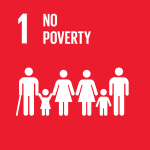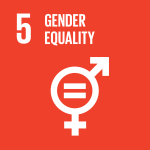
Climate change will have disproportionate and severe impacts on Bangladesh’s resources, water and food security, infrastructure, livelihoods, ecosystem health and biodiversity. With almost 70 million people in the country living in areas vulnerable to flooding, unsafe water contaminates surrounding sources and threatens public health.
To address this challenge, Footsteps—a non-governmental organization (NGO) focused on social empowerment and access to affordable clean water—has introduced Dreamwater, an innovative, portable water filtration system. Supported by the UNDP-Adaptation Fund Climate Innovation Accelerator (AFCIA), the Dreamwater device is designed as a backpack, capable of filtering 25,000 litres of water each use. It removes 99.99% of contaminants, instantly producing safe drinking water.
Reaching Bangladesh’s most vulnerable communities
Kurigram, a northern district, is the country’s poorest region, with 54 percent of its population living in extreme poverty. Footsteps launched its initiative here, aiming not only to provide safe water but also to foster entrepreneurship that strengthens local livelihoods.
So far, Footsteps has produced 30 portable filters for Kurigram and engaged 800 community members in disaster resilience and safe water access programmes.

Footsteps members show how the Dreamwater filter works at a local household in Kurigram. Photo: Footsteps
Women entrepreneurs at the forefront of change
Bangladesh’s population depends heavily on groundwater for daily consumption. During floods, however, transporting purified groundwater to affected areas is costly and inefficient. Dreamwater offers an alternative by converting surface water from lakes and rivers into clean, drinkable water on the spot.
"The filter provides access to clean drinking water during floods. Once the floodwaters recede, the same filter can be used to purify water for bottling and selling as safe drinking water. This not only ensures clean water but also creates an income opportunity. This filter is really helpful for us." – Adhuri Begum, water entrepreneur and community disaster responder from Kurigram.
Constructed from food-grade stainless steel, Dreamwater is powered by a compact battery and uses ultraviolet and nano-silver filtration. Its lightweight, portable design ensures women can easily transport it to flood-affected areas. Moreover, the device’s affordability makes it accessible to low-income households.
The Dreamwater initiative is also a pioneering business model that empowers rural women as entrepreneurs. Given the disproportionate impact of poverty on women in Kurigram, affordability is crucial. Once purchased, the filtered water can be sold at prices well below the market rate, ensuring accessibility for the community while enabling women to earn a sustainable income.

Women pose with their Dreamwater filters next to Footsteps members. Photo: Footsteps
Raising awareness and building capacity
To strengthen community resilience, Footsteps organized awareness sessions in Kurigram. These sessions used multimedia presentations, group discussions and interactive demonstrations to highlight the importance of safe drinking water during disasters. A total of 800 participants attended, reflecting strong community interest and engagement.
To support financial access, Footsteps partnered with two microfinance institutions and selected 20 women entrepreneurs as Ambassadors to pilot the system. Their efforts quickly gained traction, with 199 households purchasing water services and over 1,200 individuals gaining access to clean drinking water.

A woman participates at one of the training sessions. Photo: Footsteps
A future of equality and hope
By enabling women to lead water enterprises, the project promotes gender equality and inspires younger generations of girls with strong role models. These Ambassadors are not only disaster responders during flood seasons but also successful entrepreneurs during off-flood periods.
“We are transforming a crisis into a hope. Not only are we tackling the climate crisis but also harnessing the potential of women in communities so they can save lives and increase their own status within their communities. We are training women in rural flood prone areas, so they can be disaster responders during flood seasons and water entrepreneurs in off-flood seasons. The first thing we had to do was find the communities to work with.” – Shah Rafayat Chowdhury, co-founder and president of Footsteps.
Looking ahead, Footsteps plans to expand the Ambassadors into a formal women’s entrepreneur network to manage, sustain and improve the Dreamwater initiative. As the device is refined and its business model further validated, the organization anticipates broader partnerships with international organizations, private companies and donors committed to disaster risk reduction.
With continued support, Footsteps Bangladesh seeks to scale this model so communities can manage floods more safely while creating new opportunities for income and security.
*
Supported by financial contributions from the Adaptation Fund and the European Union, the UNDP-AFCIA programme has awarded 44 micro and small grants to locally led organizations across 33 countries worldwide, accelerating their innovative solutions to build resilience in the most vulnerable communities.
UNDP-AFCIA is one of two featured programmes under the Adaptation Innovation Marketplace (AIM), a multi-stakeholder strategic platform that promotes scaled-up adaptation at the local level.




